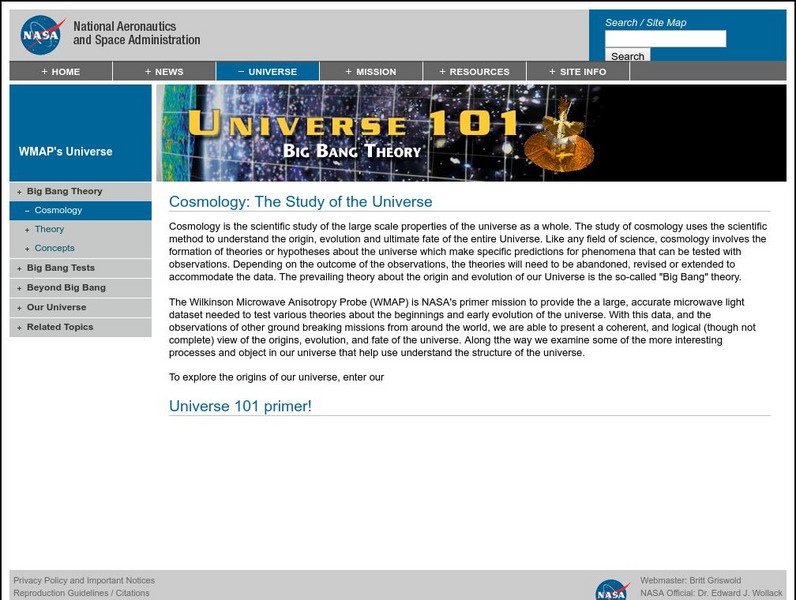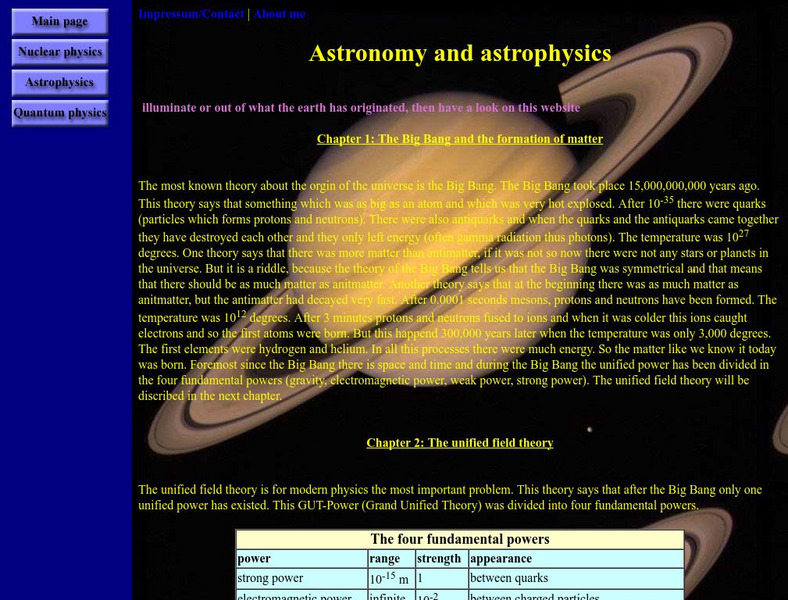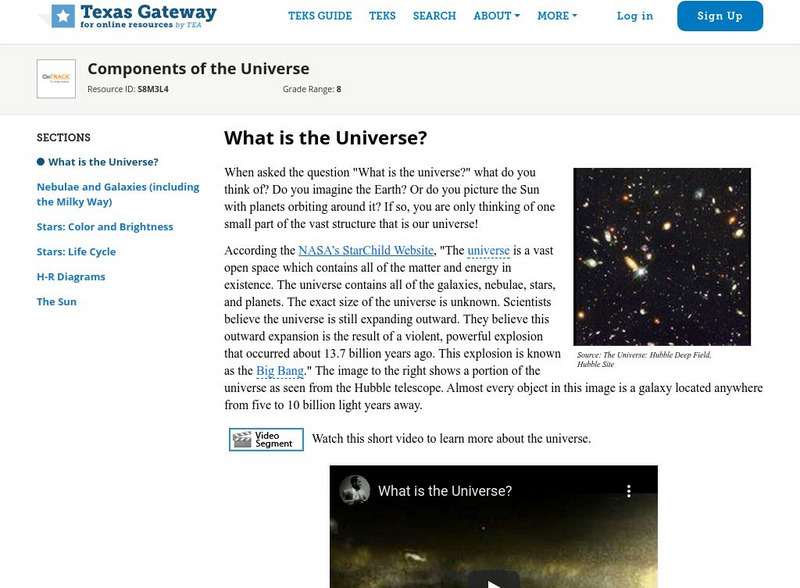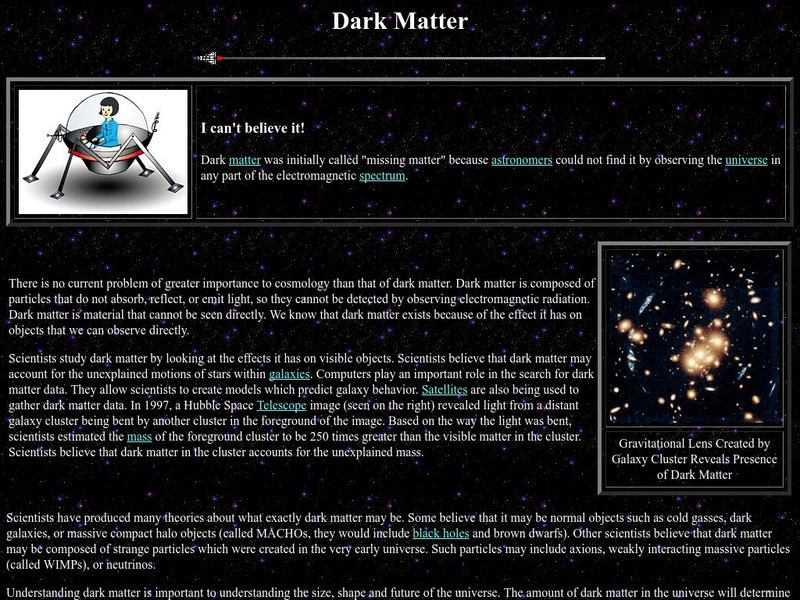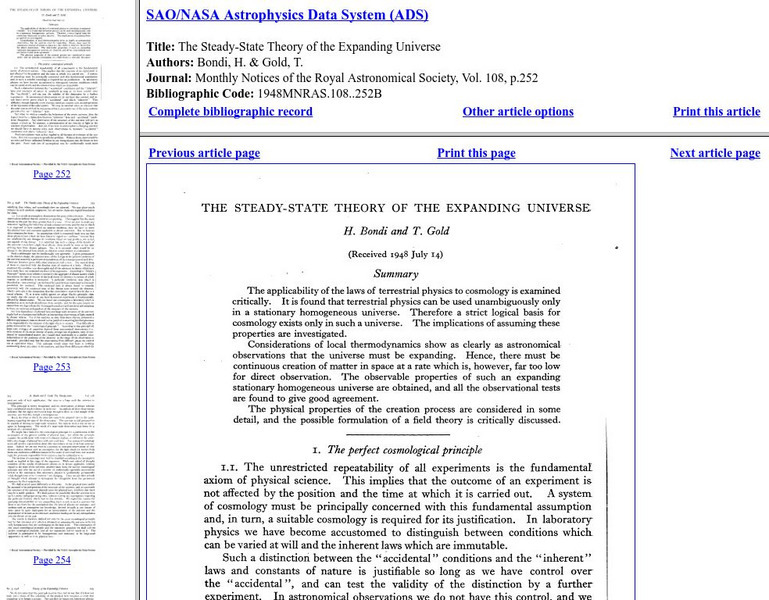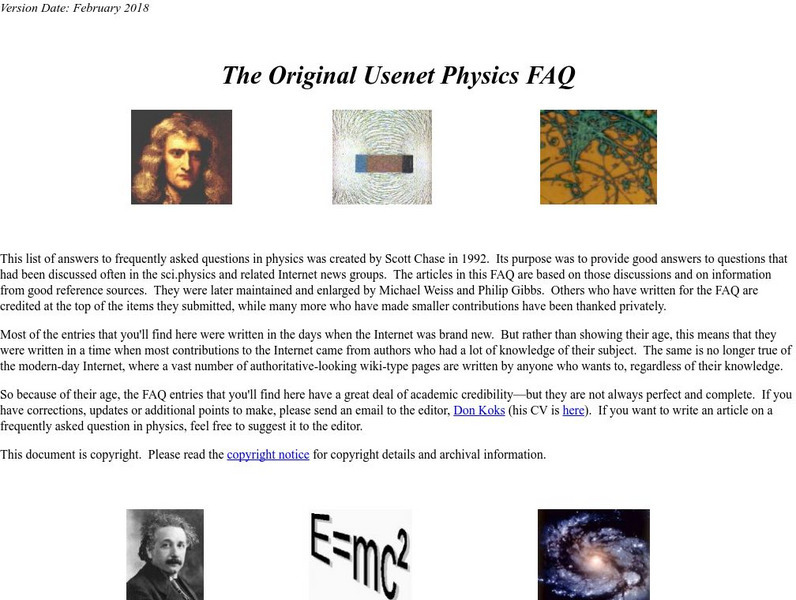Glynn County School System
Cosmology
The past, the present, and the future ... there's so much to discover about the galaxy. Scholars learn about the creation of the universe, its current structure, and how it is changing. The PowerPoint presentation begins with a...
McGraw Hill
Cosmology
Explore the birth and possible death of the universe. An interactive simulation allows learners to manipulate the Hubble Constant to model the expansion of the universe from birth. Varying the constant provides different scenarios for...
Curated OER
Heliocentric and Geocentric Models
In this worksheet, students read an informational article and view drawings of the two models. In this comprehension worksheet, students answer twelve questions.
Curated OER
Cosmic Poetry: Words and Ideas Bring the Cosmos to Life
Sixth graders study the cosmos and their thoughts and feelings about the universe. For this cosmic poetry lesson students create a venue where they can "safely" ask questions and discuss ideas.
Curated OER
Cosmology
In this space science worksheet, students find the words that are related to the study of cosmology and the answers are found at the bottom of the page.
Boston University
Boston University: The Paideia Project: Kant, the Body, and Knowledge
Discusses the significance of Kant's interest in cosmology and Newtonian mechanics. Relates Kant's beliefs about how mind and body interacted to his more influential epistemology. Article has a historical perspective and is quite readable.
NASA
Nasa Cosmology: The Study of the Universe
Cosmology is the study of the "large scale properties of the universe as a whole." In this set of sites, NASA provides information on the Big Bang Theory in a simplified language. The beginning, evolution, structure, fluctuations and...
Other
Royal Observatory, Edinburgh
The official homepage of the Royal Observatory in Edinburgh, Scotland.
Other
Astronomylinks
This is a very comprehensive site on the subject of Astronomy and Astrophysics. The site has links to many sites on topics including astronauts, astronomy, astrophysics, education, jobs, etc.
Other
Astronomy and Astrophysics
This site is about Astronomy and Astrophysics. The site has plenty of information and links to related topics.
Other
Sloan Digital Sky Survey: Galaxy Zoo
Explore the universe like you have never seen it. Take part in classifying images of galaxies taken from the Hubble telescope archives. This is a crowdsourced scientific research project.
Georgia Department of Education
Ga Virtual Learning: Cosmology
This interactive module will help students understand cosmology. Learn about the standard cosmological model and explore if life is possible in other places besides the Earth.
Texas Education Agency
Texas Gateway: What Is the Universe?
The following tutorial is an explanation of what the universe is composed of.
NASA
Nasa Space Science Data Archive: Astronomy and Astrophysics
NASA sponsored site dealing with several topics in Astronomy and Astrophysics. The site provides links to various topics.
NASA
Nasa Star Child: Dark Matter (Level 2)
This site provides a description of "dark matter" and how scientists study it. Vocabulary words linked to a glossary of terms, and a printable version are also available on the site.
PBS
Pbs Learning Media: Einstein: How Smart Was He?
This essay from the NOVA Web site explores the impact Einstein made on physics and most everything we know about the cosmos.
Harvard University
Royal Astronomical Society: Steady State Theory of an Expanding Universe
In-depth research about the steady-state theory of the expanding universe found within a bibliographic database of astronomical literature. Learn about the theory that asserts that new matter is continuously created as the universe expands.
Massachusetts Institute of Technology
Mit: Open Course Ware: Exploring Black Holes: General Relativity and Astrophysics
College-level physics course focusing on black holes. Course topics include general relativity, astrophysics, and elements of cosmology . Course features include selected video lectures, lecture notes, assignments, and exams.
TED Talks
Ted: Ted Ed: What Light Can Teach Us About the Universe
Pete Edwards outlines the six unique messages that light carries which, when put together, disclose a stunning amount of information to astronomers about the universe. [4:07]
TED Talks
Ted: Ted Ed: The Beginning of the Universe, for Beginners
How did the universe begin and how is it expanding? CERN physicist Tom Whyntie shows how cosmologists and particle physicists explore these questions by replicating the heat, energy, and activity of the first few seconds of our universe,...
Symmetry Magazine
Symmetry Magazine: Explain It in 60 Seconds: Dark Energy
Dark energy, described here, is the ultimate mystery for scientists. It is the force that is causing the expansion of the universe they believe. "Explain It In 60 Seconds" is an article series that aims to summarize in a few paragraphs...
PBS
Pbs Teachers:origins Back to the Beginning
This hour long program by NOVA is split into six segments and examines a issues influencing scientists' current understanding of how the universe was formed. This includes The Big Bang and its lasting effects.
Other
Uc Riverside: Usenet Relativity Faq
A physics usenet listing of frequently asked questions relating to relativity, answered by a number of scientists. Administrivia and Reference, Speed of Light, Special Relativity, General Relativity and Cosmology, Black Holes. Loads of...
Famous Scientists
Famous Scientists: Edwin Hubble
Learn about Edwin Hubble, an American astronomer who is known for playing a vital role in the development of extragalactic astronomy.








